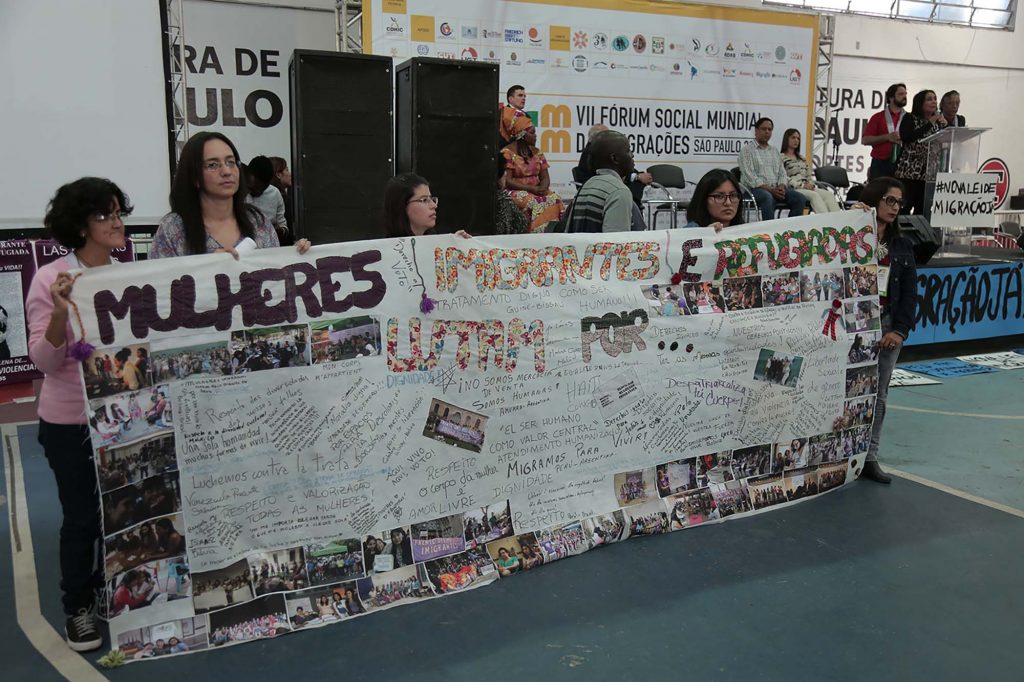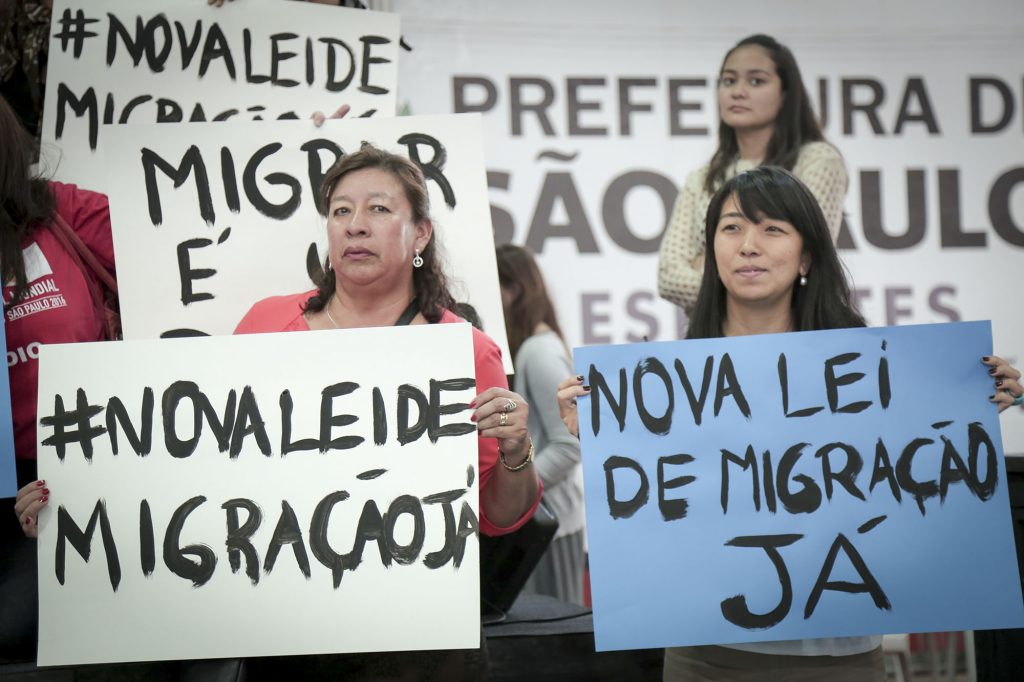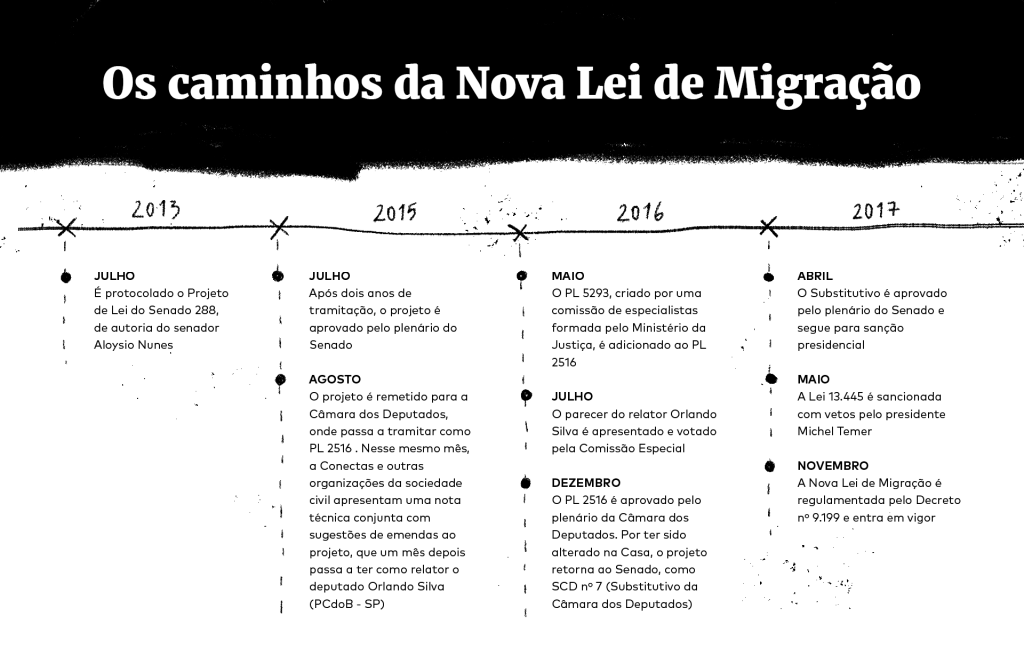Do you know the story underlying the approval of the Migration Law?
From the outset Conectas has been active in discourse regarding the New Migration Law, proposing improvements, talking to members of Congress and holding discussions with organisations working with migrant populations
 Thousands of migrants are forced to leave their countries of origin by economic crises and even wars. See here, how the Migration Law changes this scenario.
Thousands of migrants are forced to leave their countries of origin by economic crises and even wars. See here, how the Migration Law changes this scenario.
With the issue of migration in evidence in Brazil, the bill for a New Migration Law was presented for debate in the National Congress. Texts were presented for three years and ten months, before presidential sanction was given. This process was closely monitored by civil society, including Conectas, who joined discussions with the different political forces and helped to ensure the votes needed for the bill’s approval.
Conectas Programme Coordinator, Camila Asano, recounts that the organisation, with experience in national and international advocacy, began to work in conjunction with institutions involved with assisting migrants, in order for the law to include their needs.
What was needed for a positive outcome?
Read more
A number of strategies contributed to approval of the bill. Firstly, civil society worked in a constructive articulate way with contributions to ensure that the New Migration Law respected human rights and that the demands of the migrant population were heard. In addition, continuous discussions were needed, with members of the Congress committees to which the bill had to be submitted. Finally, this was a cross-party action involving parliamentarians from diverse political spectrums and parties.
“We managed to talk to different parties with varying views on the political spectrum, raising awareness about just how outdated the former Foreigner’s Statute was and how out of step it was with the current situation and with the Constitution. This was how we managed to get involved.” She said.
Did you know that the immigrants were also involved in the movement?
As we saw in the last article in this series, the creation of a New Migration Law arose essentially from the demands of migrants themselves. Historically, they have faced a number of difficulties in this country.
 Women refugees protested during the VII World Social Forum on Migrations.
Women refugees protested during the VII World Social Forum on Migrations.
Two large events held in São Paulo meant they were also able to present their claims for the new legislation and this strengthened the influence of work being carried out by organisations in Brasília:
- 1st COMIGRAR – Conferência Nacional de Migrações e Refúgio (2014) – Organised by the Justice Ministry. Comigrar was attended by around 800 participants over one weekend and involved around 5 thousand people in the preparatory stages.
- 7th World Social Forum on Migrations (2016) – Two years later, at Comigrar, the demand for a New Migration Law was seen to be even stronger and the four day event in São Paulo drew 1.6 thousand people of 57 different nationalities.
Communication, communication and more communication
The year of 2016 saw great political turbulence in Brazil. In May, the plenary of the Chamber of Deputies passed the impeachment process of Dilma Rousseff and the vice-president at that time, Michel Temer took over, initially as acting president and subsequently as president, when the case was concluded in the Senate, at the end of August.
It was no mean feat to gain approval for the Migration Law within this scenario, because anti-immigration discourse started to gain force in society and there were burgeoning moves within the National Congress to hinder its progress.
 Members of social movements during the closing session of the VII World Social Forum on Migrations (FSMM), at the Universidade Zumbi dos Palmares, São Paulo.
Members of social movements during the closing session of the VII World Social Forum on Migrations (FSMM), at the Universidade Zumbi dos Palmares, São Paulo.
In addition to the Forum other communications strategies were used to support the law, such as actions on social media using the hashtags #NovaLeideMigraçãoJá and #MigrarÉDireito, launching a petition by the organisations, with over 9 thousand signatures, as well as content to raise public awareness.
The outcome of all of this was positive. After much dialogue, the National Congress gave their approval and Law 13.445 was sanctioned, although not in its entirety, in 2017 by President Michel Temer,.
Vetoed resolutions
Article 118 is one of these vetoes. This allowed authorisation of residency to migrants who had been in Brazil before July 2016, irrespective of their migratory situation. This measure know as “the migratory amnesty” had been conceded by Presidents Fernando Henrique Cardoso and Luiz Inácio Lula da Silva.
Sixteen organisations, including Conectas, signed a letter addressed to the National Congress calling for these vetoes to be overturned , as they were in contravention of the consensus that had been established during the process. However, it was not possible to revert this scenario.
 See below the process that activists and organisations underwent up to the point when the New Migration Law was passed.
See below the process that activists and organisations underwent up to the point when the New Migration Law was passed.
Why did this happen? According to the Conectas Programme Coordinator the reason was a combination of a lack of knowledge about the subject and conservative politics. “There was improper use of the power to veto which should be used for articles that are considered to unconstitutional and in this case it was a political decision.” Asano said.
The Migration Law has undoubtedly meant numerous advances but has also led to some impasses. In the next report you will be able to find out more about the impact and challenges that followed the legislation coming into effect.
Subscribe to our newsletter and receive further information on the importance of the New Migration Law in Brazil.






